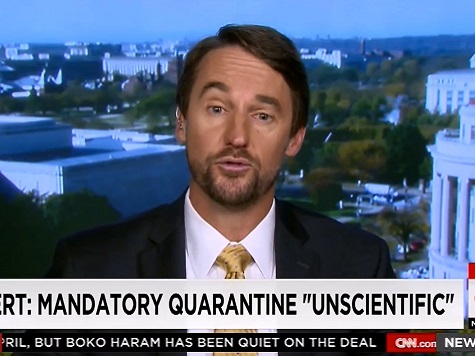Gavin Macgregor-Skinner, an epidemiologist and Global Projects Manager for the Elizabeth R. Griffin Foundation, who has led teams of doctors to treat Ebola in West Africa, reported that he “can’t tell them [his doctors] to tell the truth [to U.S. officials]” on Monday’s “CNN Newsroom.”
“At the moment these people are so valuable to believe the effort to protecting not just U.S. citizens, but every citizen in the world and again as we’re seeing the need is to go back to West Africa, I have to ensure they come back here, they get the rest needed. I can’t tell them to tell the truth at the moment because we’re seeing so much irrational behavior,” he stated.
“I’ve come back numerous times between the U.S. and West Africa. If I come back now and say ‘I’ve been in contact with Ebola patients,’ I’m going to be locked in my house for 21 days,” Macgregor-Skinner said as his reason for not being truthful with officials, he added, “when I’m back here in the US, I am visiting US hospitals everyday helping them get prepared for Ebola. You take me out for three weeks, who’s going to replace me and help now US hospitals get ready? Those gaps can’t be filled.”
He argued that teams of doctors and nurses could be trusted with the responsibility of monitoring themselves, stating, “When I bring my team back we are talking each day on video conferencing, FaceTime, Skype, text messaging, supporting each other. As soon as I feel sick I’m going to stay at home and call for help, but I’m not going to go to a Redskins game here in Washington D.C. That’s irresponsible, but I need to get back to these hospitals and help them be prepared.”
When asked about Dr. Craig Spencer in New York City riding the subway after returning from West Africa, Macgregor-Skinner pointed to CDC guidelines that tell doctors and nurses returning from West Africa to control their movements and said his team follows those.
“We’re responsible, we know there is no cure, no vaccine for Ebola,” he said. “If any of us feel symptomatic we need to be [checked] into hospital very quickly. We also know if we feel symptomatic we’re not going to go out and mix with crowds, mix with the public, and that’s the responsibility that doctors and nurses take everyday.”
Follow Ian Hanchett on Twitter @IanHanchett

COMMENTS
Please let us know if you're having issues with commenting.